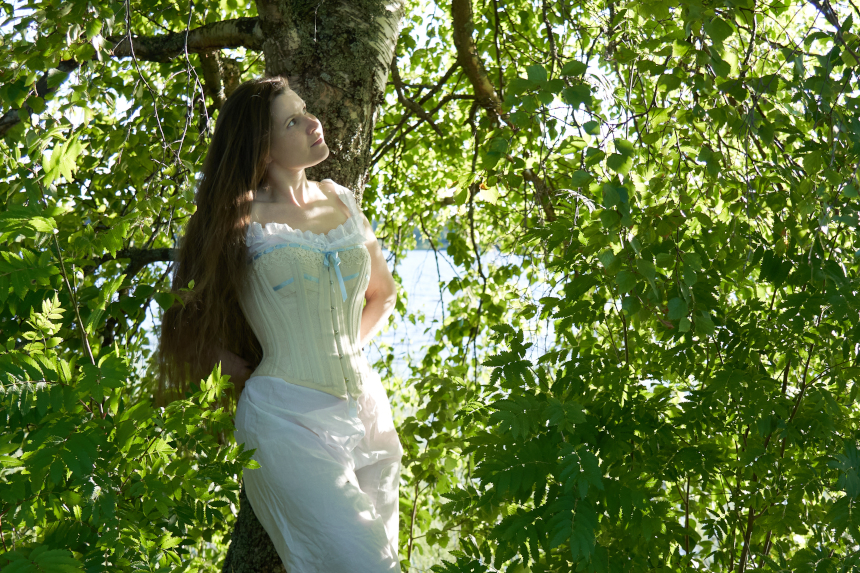
Summer corset, 2021
The summer of 2021 was very hot in Finland. On one of the hottest days during it I was at an Edwardian event, and even though I was wearing a thin linen blouse I probably got a mild heat stroke - I have never been good at coping with hot temperatures. In the morning when we had been dressing up I had admired a friendīs (known in Instagram and youtube as @sew_through_time) new summer corset made of cotton material that looks a bit like monks cloth. It seemed very well breathable and obviously she fared better than I that day!
While anxiously awaiting the next event, dripping with sweat at the very thought despite having a new unlined cotton dress I began to think that a better ventilated corset might be a great addition to my wardrobe.
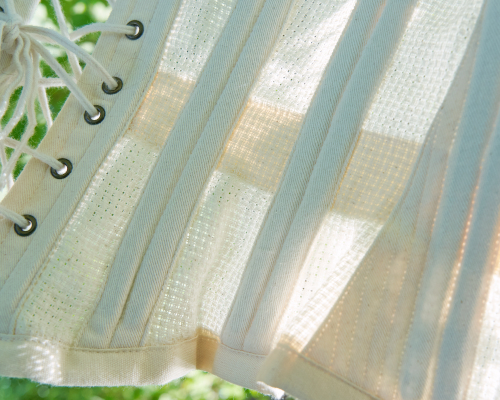
The same material was still available in a local chain store and it was very affordable, so I bought some, thinking that it might also be useful for many other craft purposes. I think it's originally intended for woolwork of some kind. I didnít have a busk in my stash but lovely @sew_through_time gave me one and also some additional spiral steel boning because I didnít have enough and had to time to order anything either.
The material was slightly stiff to begin with but felt like it would quickly soften in use and even while sewing. I wondered a bit whether it would be durable enough for the strain of lacing, but then I decided that if I was to make a new corset I could as well make it not just breathable but more comfy and relaxed and a bit looser in general. Trying something new and figuring out what supportive structures I might need while still keeping it as light as possible would also be interesting.
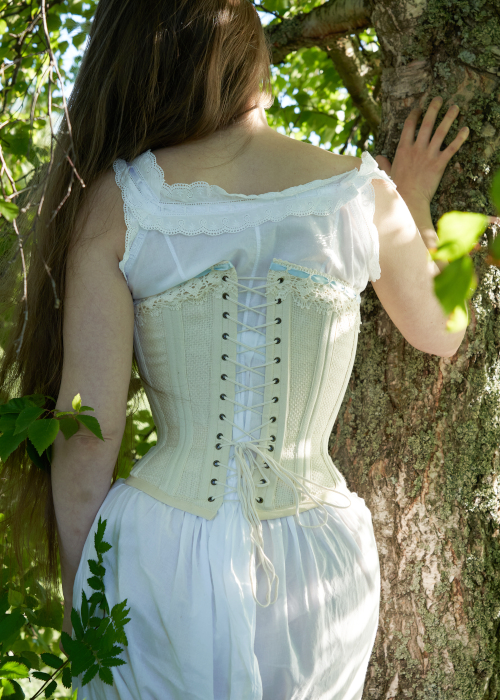
Choosing
the style
As I had a rather tight schedule I was more inclined to whip up something wearable fast than get really deep into the secrets of historical net and ribbon corsets as interesting as they would be. I took a quick look at what Pinterest algorithms chose to send my way and chose what seemed likely to work and not be too complicated to make without being too picky about the exact decade.
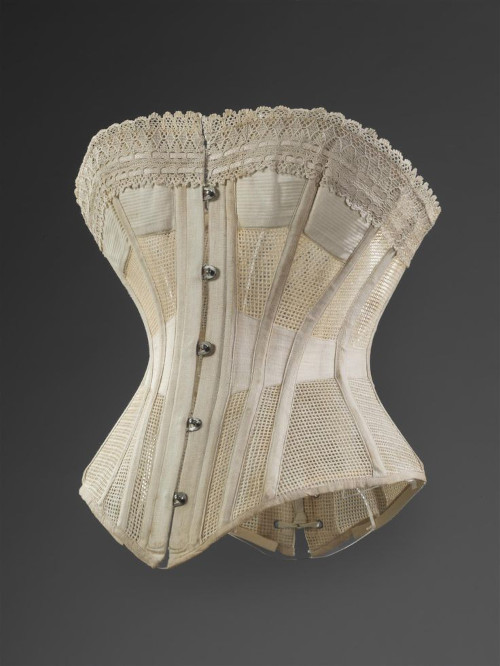
One of my favorites was this pretty one at V&A Museum, even though itís dated much later. Like many normal one layer corsets it has supporting fabric pieces at the bust area which seemed a good idea to me. It also has a nice detail of shaped waistband piece.
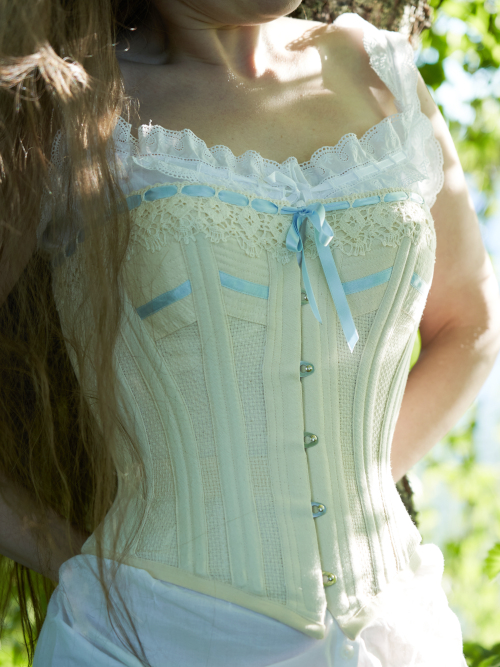
I used my previous corset pattern but adapted it a bit looser. I also had to shorten it quite a bit because the busk was shorter, but that actually works well because it gives more limb movement and is also more comfortable when sitting in the ground on a picnic - something I probably would not have thought about.
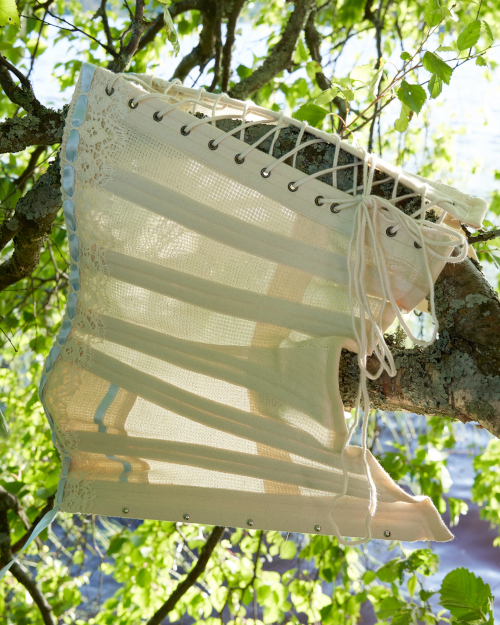
Making
the corset
The loosely woven fabric seemed likely to fray very easily and also stretch on bias edges, so I had to give much more thought on treating seam allowances than when working with coutil or like material. I began by drawing all the pieces on the fabric with water-soluble marker. Then I sewed over the seam allowances with 3-stitch zig zag because in my experience itís much better at binding loosely woven coarse fabric edges than either regular zig zag or overlock. On the top and bottom edges I sewed a narrow strip of bedsheet-weight cotton to keep them from stretching. Only after this I cut the pieces apart.
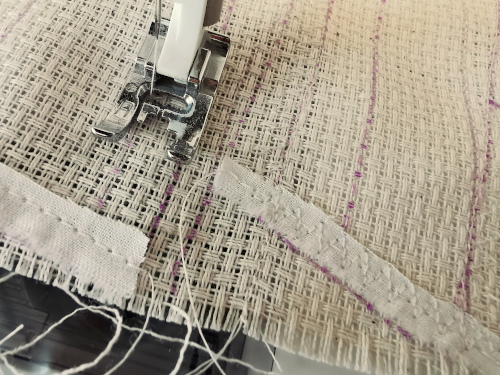
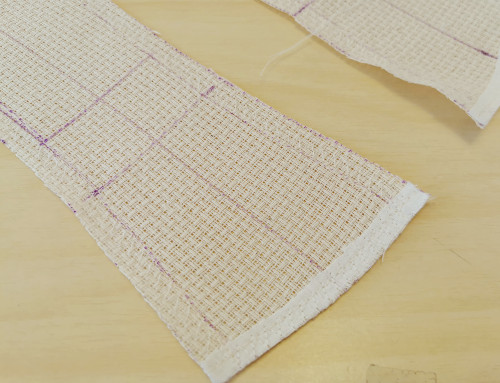
Luckily I had some cotton twill in matching color in my stash for the boning channels and fabric pieces. I was also quite soft, so I sewed additional strips of coutil on center front and back to support the busk and especially the back lacing holes.
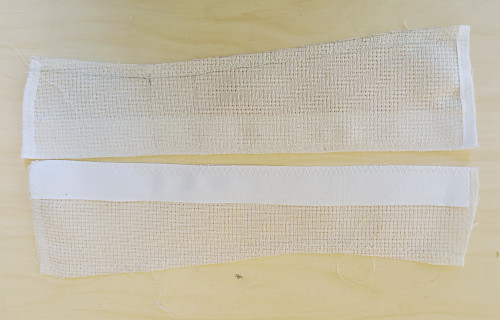
Next I sewed on the supporting fabric pieces on the bust. I was too lazy to put on cording so I just sewed a few rows of stitching to imitate the look. As it would be boring to make a strictly functional corset I couldnít resist adding a bit of satin ribbon almost as an afterthought. The problem of decorative details is, though, that they need more careful alignment in different pieces. Here they donít match in the seams and are slightly asymmetrical in general. Happily the boning channels in between fool the eye.
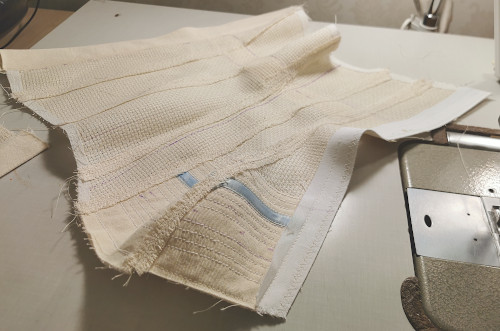
After sewing the pieces together and pressing the seam allowances open I stitched them down close to the seam as a further safeguard against tearing. It also kept them conveniently from turning in the wrong direction before adding the boning channels.
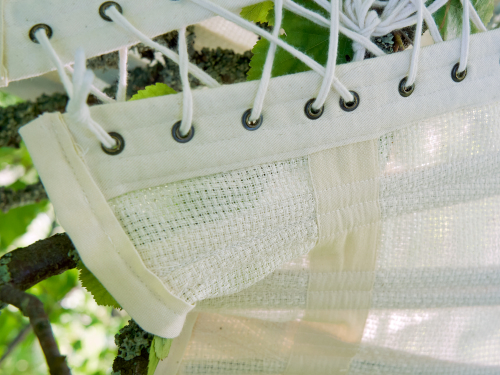
As I mentioned earlier, the original corset I had used as inspiration had a shaped facric piece on the waistline. It gave a nice look and would also no doubt give the waist area a lot of support. However I finally decided to change it for a simple 3cm cotton band which would be much faster to stitch in. After that I cut the boning channels and the back lacing cover piece from twill and sewed them on. On the sides I cut one boning channel to widen towards the bottom to add a bit of extra support on the hip area like in my coutil corset, though itís doubtful whether it made a lot of difference in this shorter one.
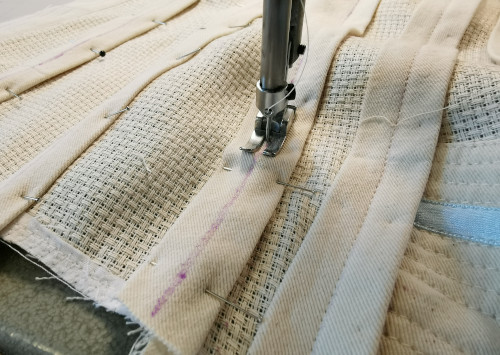
After that I cut the boning channels and the back lacing cover piece from twill and sewed them on. On the sides I cut one boning channel to widen towards the bottom to add a bit of extra support on the hip area like in my coutil corset, though itís doubtful whether it made a lot of difference in this shorter one.
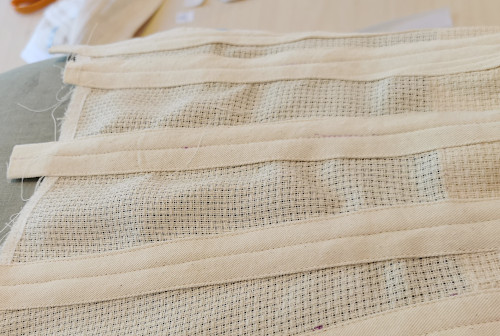
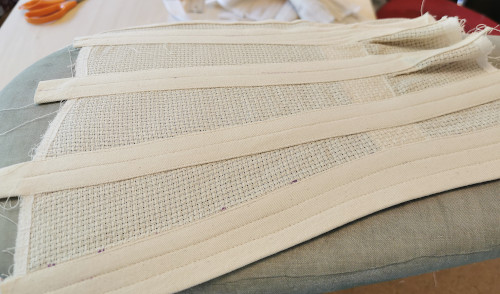
The seams pulled a little after adding the boning channels but the loose weave evened out very smoothly with pressing. I sewed in the busk and finished the front edges. Then I edged the corset with the same cotton tape I had used for the waistband, again miraculously a great colour match. All too often all the whites and creams are annoyingly in slightly different shades.
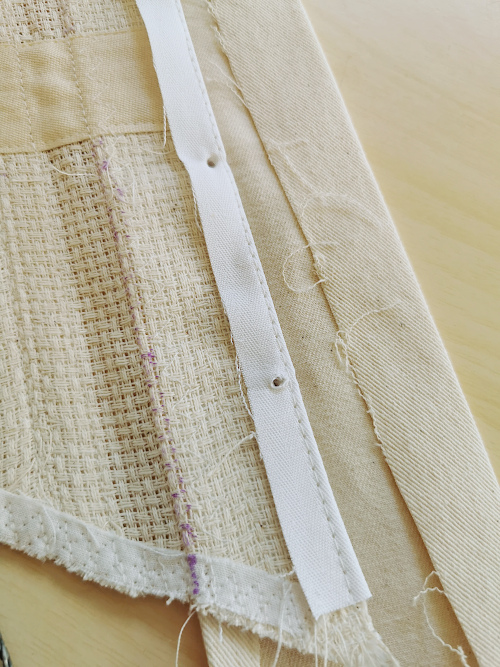
As stated before, making a plain corset was a bit boring idea so I was happy to find a strip of cream cotton lace in the stash. I sewed it to the top edge and then threaded the light blue satin ribbon through it. Aww, the cuteness.
As sometimes happens, when you create a great and detailed survival strategy the threat never materializes. The temperatures finally dropped before the next event and I would have been quite comfortable in my old coutil corset. Still, it was very comfortable to wear thanks to looser fit, shorter length and flexibility. As my dress had ended up a bit loose too, a tighter lacing would have been totally unnecessary. As for the comparison in breathability Iíll have to wait for other hot summer days in the future.
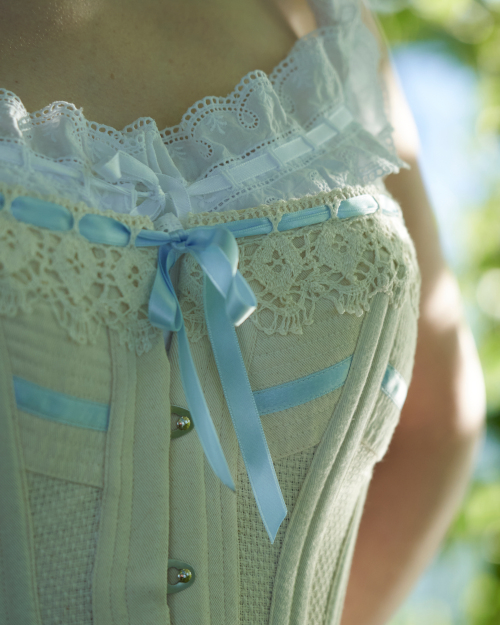
There appeared some problems on the first wearing too, though. As the materials were significantly more lightweight than in my coutil corset they failed to bend the boning on rounded shape on the bust area, and instead the profile is much straighter with the ends of the bones jutting out. I guess I really should have added that cording. It didn't help that I had used stiffer spiral steel on the front seams to support the stomach area than in the sides and back where I wanted more flexibility - I had a selection of slightly different leftover bits to use. I could in theory change the boning there and maybe I will in the future, but for now it will do - especially as I still havenít gotten round to buying more boning. In case you wonder why the bust area looks even this nicely rounded with this flimsy corset structure I'm actually wearing a bra with straps removed under it.
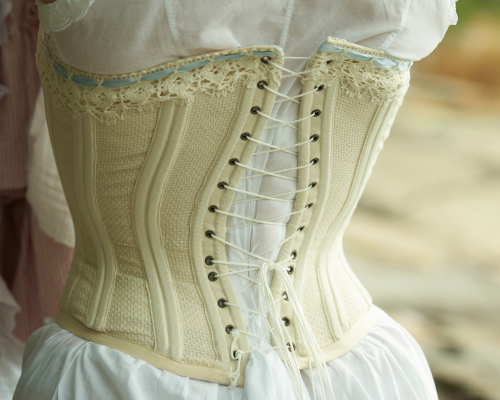
Another problem was that the lacing tended to pull wider at the waistline. I had made the rather stupid mistake of putting spiral boning also on the back edges without considering that it bends sidewards too. I didnít want super stiff steel boning in this corset so I changed the back boning into thick cable tie which I just managed to cram into the boning channels. Another stupid decicion I had made was to use thin and super slippery nylon lacing cord which I had bought after getting fed up with cotton laces that wear out and break at the most inopportune moment. It was totally misplaced here, as it was really quick to slip through metal grommets and adjust to the gapping shape. Along with the boning I changed it into a cotton lace and now it works much better.
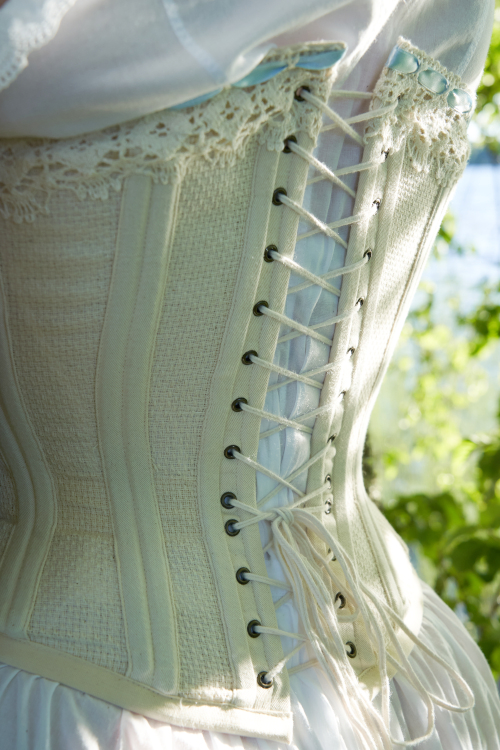
Apart from these issues I think the summer corset turned out quite well considering that it was a bit experimental and made really fast. I tried it for the first time only after it was finished, as I thought that if there was some big issue on the fit or pattern shapes it wouldn't be worthwhile to start unpicking the easily raveling fabric with small seam allowances anyway. Okay, I might have detected the front boning problem sooner, but I think I really realized it only when I put a dress over it.
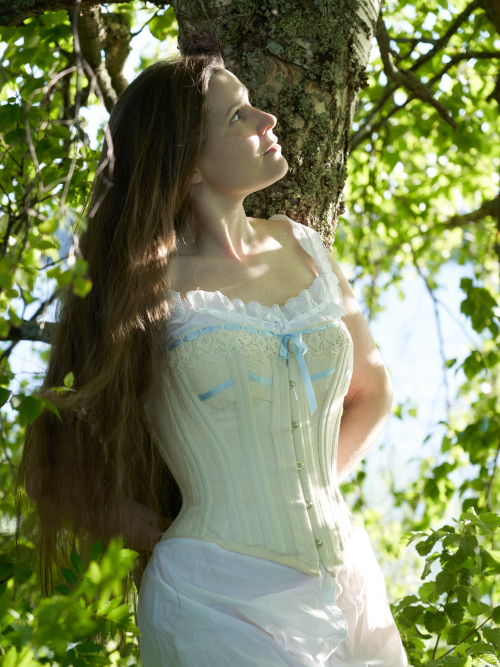
Like I mentioned above, the corset was very comfortable and worked well with the cotton dress I used. It might not look so good under a more fitted dress (frankly I have been too lazy to try), but it will probably get some use for more relaxed wear. The durability of the material and construction also remains to be seen, but even if it should wear out before its time at least I did not put much time or money into it. The busk and boning can always be reused.
Most of all it was a fun little piece to make and turned out very pretty!